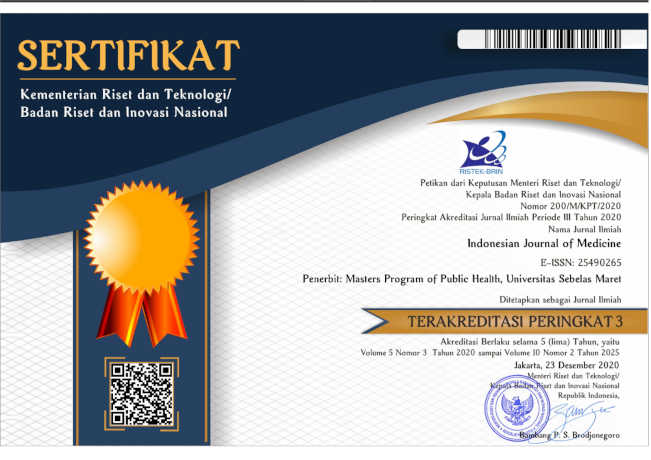Association between Hemodialysis Adequacy, Family Support, and Quality of Life in Chronic Renal Failure Patients
DOI:
https://doi.org/10.26911/theijmed.2017.2.1.42Abstract
Background: Hemodialysis is one of renal replacement therapy for patients with chronic renal failure (CRF). The quality of hemodialysis is largely determined by the recommended dose of hemodialysis. Biological and psychological changes are often faced by patients undergoing hemodialysis, which can affect their quality of life. Family support is an important factor that serves as a support system for the patients to face the health problems. This study aimed to determine the association between hemodialysis adequacy, family support, and quality of life in chronic renal failure patients.
Subjects and Method: This was an analitic observational study with cross sectional design. It was conducted at Kasih Ibu Hospital, Surakarta, Central Java. A total sample of 102 patients with chronic renal failure who underwent hemodialysis were selected for this study using random sampling. The dependent variable was quality of life. The independent variables were hemodialysis adequacy and family support. The quality of life was assessed using the WHOQoL questionnaire. The hemodialysis adequacy was measured by Ureum Reduction Rate (URR) formula. Family support was measured by family support questionnaire. The data were analyzed using Chi Square test, Mann Whitney test, and logistic regression
Results: Patients with chronic renal failure had better quality of life if they underwent adequate hemodialysis (OR= 5.34 95% CI= 2.20 to 12.98 p= 0.001) and received strong family support (OR= 7.74; 95% CI= 3.13 to 19.13 p= 0.001).
Conclusion: Quality of life of the patients with chronic renal failure is determined by hemodialysis adequacy and family support.
Keywords: chronic renal failure, hemodialysis, adequacy, family support, quality of life
Corespondence: Leo Chandra Wisnu Pandu Winata. Masters Programs in Family Medicine, Sebelas Maret University, Jl. Ir Sutami 36A, Surakarta. Email: leochandrawisnupw@gmail.com
Indonesian Journal of Medicine (2017), 2(1): 63-72
https://doi.org/10.26911/theijmed.2017.02.01.07
References
Ayoub, A.M., Hijjazil, K.H. 2013. Quality Of Life In Dialysis Patients From The United Arab Emirates. Journal of Family and Community Medicine.
Bele, S., Bodhare, T., Mudgalkar, N., Saraf, A., Valsangkar, S. 2012. Health Related Quality Of Life And Existential Concern Among Patients With End Stage Renal Disease. Indian Journal of Palliative Care.
Black, J.M., Hawks, J.H. 2005. Medical Surgical Nursing Clinical Management For Positive Outcome 7 Edition. Philadheiphia; W.B Saunders Company.
Cleary, J., Drennan, J. 2005. Quality of life of patients on hemodialysis for end- stage renal disease. Journal of Advanced Nursing.
Ferrans, C. & Powers, M. 1993. Quality of life of Hemodialysis Patients, Anna Journal, 20 (5), 575-581.
Friedman, M., Bowden, Jones E.G. (2014). Family Nursing: Research, Theory & Practise. USA. Conecticut: Appleton and Lange.
Griffin, K. W., Friend, R., Kaell, A. T., & Bennet, R. S. 2001. Distress Disease Status among Patients with Rhematoid Arthritis: Role of Coping Styles and Perceived Responses from Support Providers. Annals of Behavioral Medicine, 23. Diakses pada tanggal 5 Maret 2017 dari http://www.annals.org.
Himmelfarb, J., Ikizler, T. A. 2010. Medical Progress Hemodialysis. Engl J Med.
Iskandar, T. 2008. Studi Fenomenologi Stres dan Dukungan Sosial yang Dipersepsi oleh Pasien HIV/AIDS. Tesis. Fakultas Psikologi UI.
Istiqomah, N. 2009. Hubungan antara Dukungan dan Penerimaan pada Pasien Hemodialisis di Surabaya.
NIDDK, 2012. Kidney Disease Statistics for the United States. U.S Departmentof Health And Human Services. USA.
NKF-K/DOQI, 2006. Clinical Practice Guidelines and Recommendations.National Kidney Foundation. New York.
Pakpour, A., H., Saffari, M., Yekaninnejad, M. S., Panahi, D., Harrison, A.P. 2010. Health Related Quality Of Life In A Sample Of Iranian Patients On Hemodialysis. International Journal Kidney Disease.
Perhimpunan Nefrologi Indonesia. 2014. 7th Report of Indonesian Renal Registry. Jakarta.
Pourfarziani, V., Ghanbarpour, F., Nemati, E., S., Einollahi., B. 2008. Laboratory Variables and Treatment Adequacy in Hemodialysis Patient in Iran. Journal of Nursing Scolarship.
Rambod, M., Rafii, F. 2010. Perceived Social Support And Quality Of Life In Iranian Hemodialysis Patients. Journal Of Nursing Scholarship volume 42, Issue 3, Pages 242–249.
Ratna, W. 2010. Sosiologi dan Antropologi Kesehatan. Yogyakarta : Pustaka Rihamma.
Saragih D.A. 2010. Hubungan Dukungan Keluarga dengan Kualitas Hidup PasienGagal Ginjal Kronis yang Menjalani Terapi Hemodialisis di RSUP HajiAdam Malik Medan. USU. Medan.
Septiwi C. 2010. Hubungan Antara Adekuasi Hemodialisis dengan Kualitas Hidup Pasien Hemodialisis di Unit Hemodialisis RS Prof Dr. Margono Soekarjo Purwokerto. Tesis. Umversitas Indonesia. Jakarta.
United State Renal Data System (USRDS), 2013. Incident and Prevalent Count by Quarter. Available From: http://www.usrds.org/qtr/default.
World Health Organization. 2004. The World Health Organization ; Quality Of Life. Diakses pada 2 Januari 2016 dari http//www.whoqol.breff.org











